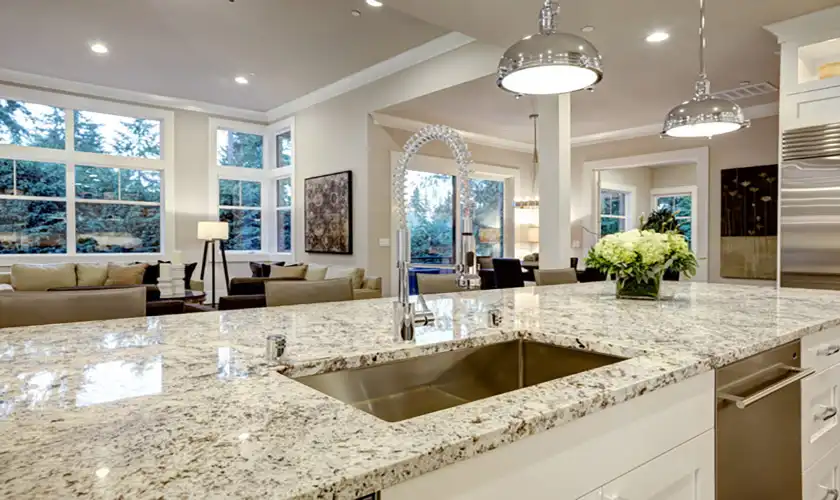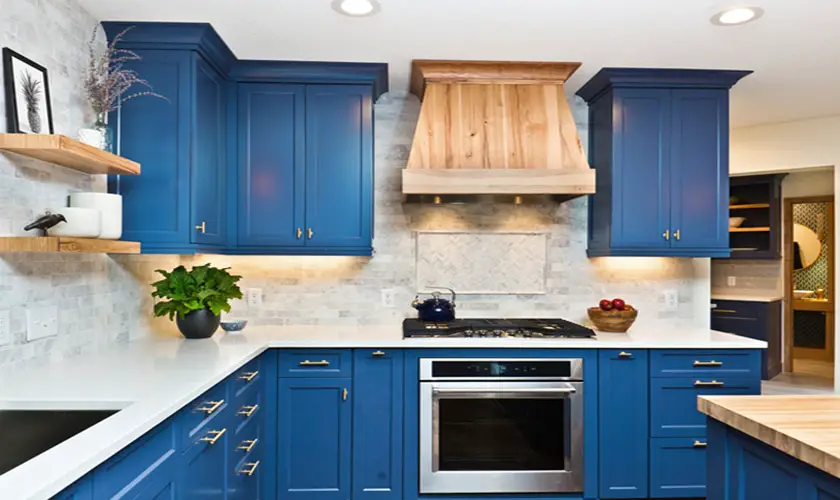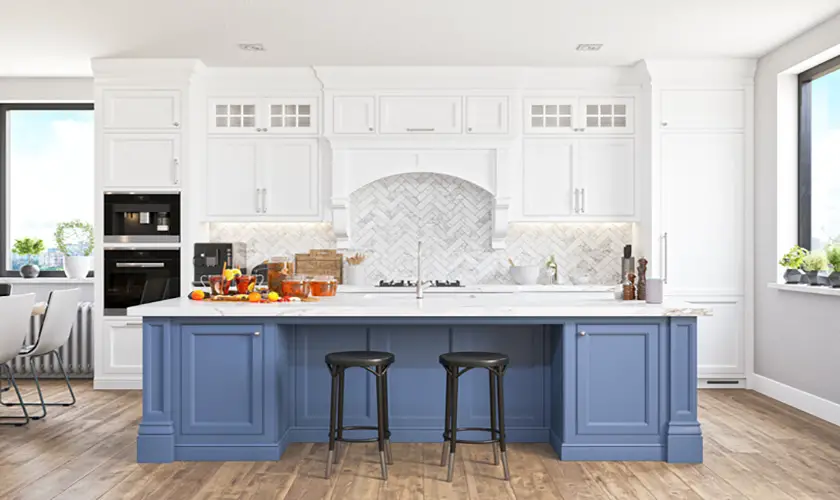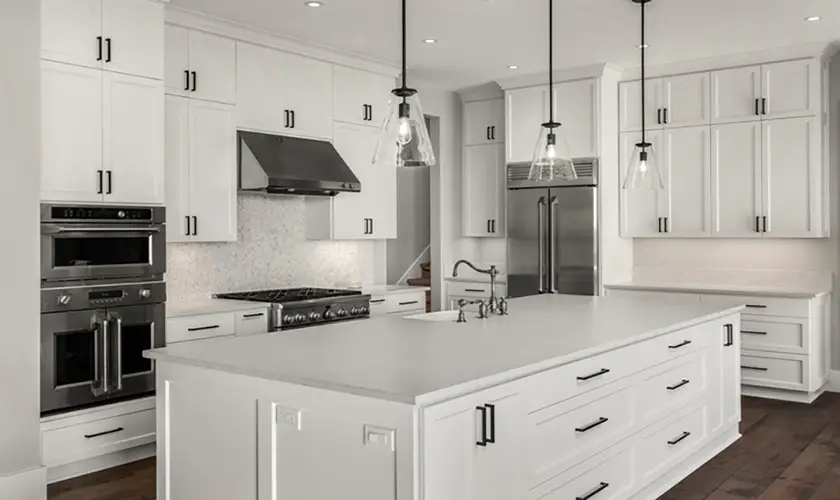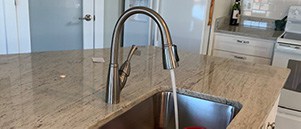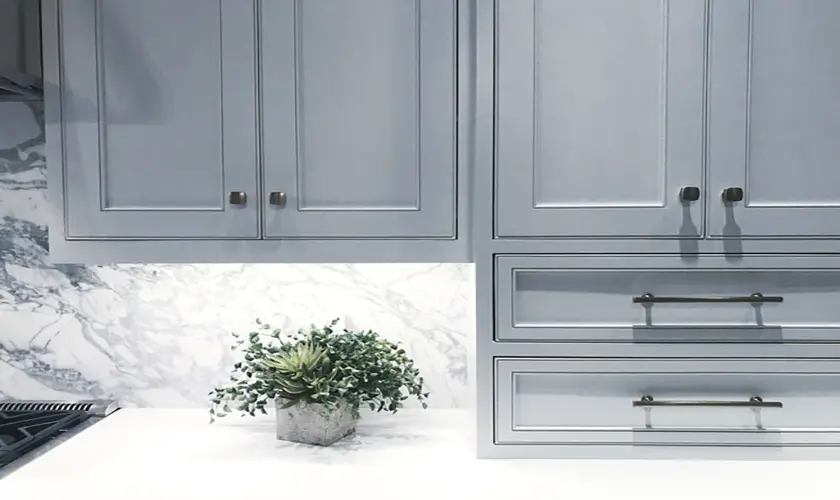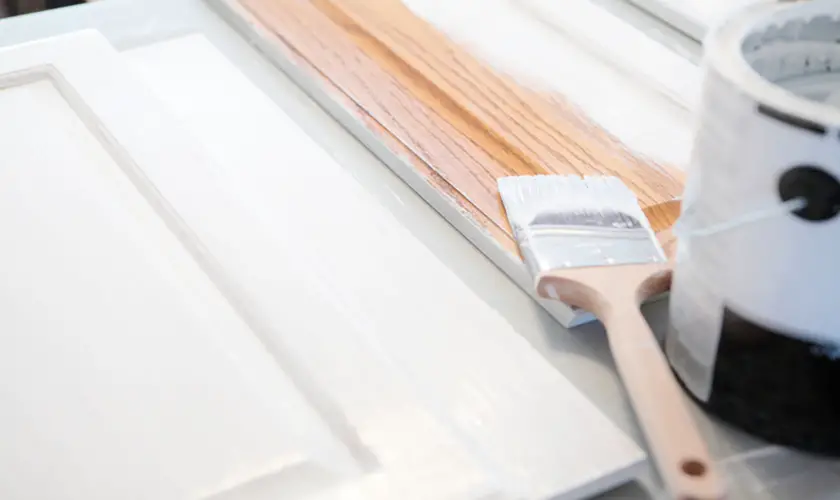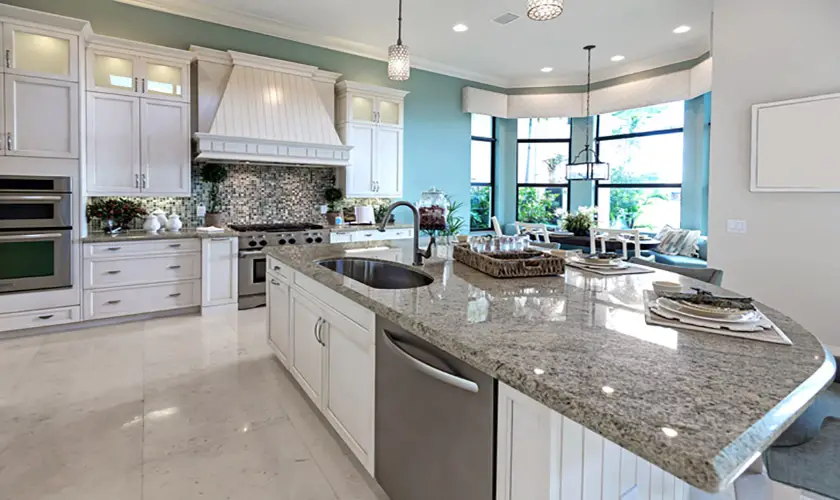
If you are here, you’re likely thinking about new countertops and wondering what types of countertops are the best material for you. You need affordable, safe, and durable material for your kitchen and bathrooms.
While there are many popular countertop materials on the market, let’s look at two: Corian and granite. Do Corian countertops cost less than granite? Let’s find out.
Corian costs between $45 and $65 per square foot. Granite costs between $50 and $200 per square foot. Corian offers superior const advantages over granite. However, the price difference is not as significant as it sounds.
You can expect to pay $2,200 to $5,000 for Corian countertops. At the same time, granite poses a similar, yet slightly less, average cost of $2,250 to $4,500. Granite prices vary on the rarity of the stone and its thickness. Granite tile is inexpensive at about $5 to $15 per square foot.
Are you looking for new granite, quartz, Corian, and wood countertops? If so we can help. Get FREE quotes for local countertop installers. All contractors are licensed, screened, and insured.
Corian prices also vary in thickness and style. Quartz is a high-end Corian made to mirror the beauty and durability of granite.
Quartz is an engineered stone made by grinding natural quartz into dust and combining it with synthetic materials, a binding agent, and other adhesives. It is baked into slabs using high heat to create a durable surface ideal for countertops due to its heat resistance and ability to resist staining.
Quartz countertops cost about $50 to $200 per square foot. You can expect to pay between $3,000 to $7,500. In some cases, quartz can be more expensive than granite.
With all the composites on the market today, granite remains popular amongst homeowners. Some lines of Corian surfaces will cost less than granite, while others, like quartz, can exceed the cost of granite tops.
There are several factors to consider, like durability, composition, and maintenance. Despite the slightly higher price, granite offers longer life and a higher resell value than Corian.
Because of their different pricing ranges, Corian and granite have considerable variances. This article looks at various factors to help you comprehend the pricing difference entirely.
So, keep reading.
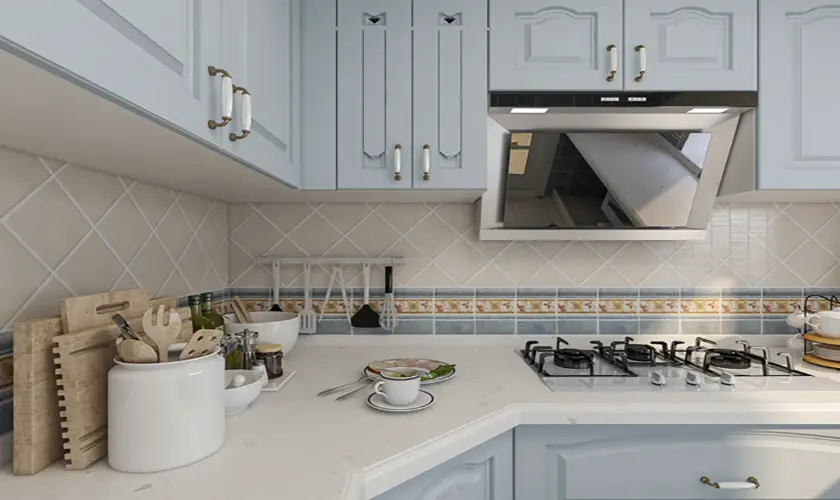
Countertop Options: Corian vs. Granite?
You can install countertops in a variety of areas and rooms. They are commonly found in kitchens, bathrooms, and some patios. So, for long-term service delivery, quality must be top-notch. Many types of countertops fit the bill.
The cost of a solid surface countertop material is one of the aspects that may influence your decision. Because we already know that Corian can be less expensive than granite, let’s look at their price range.
Corian vs. Granite Cost: What Affects the Price
Corian countertops have a price tag of approximately $45 to $65 per square foot. On the other hand, granite can cost $50 but is as high as $200 a square foot. The range in pricing is because of size, pattern, and different colors. As you can see, the difference in Corian vs. granite price is not that significant unless you’re talking about rare types of granite.
But still, on pricing and cost, you also have to consider more things like service, transport, and installation of the countertops. So, every penny saved can help the overall price to fall.
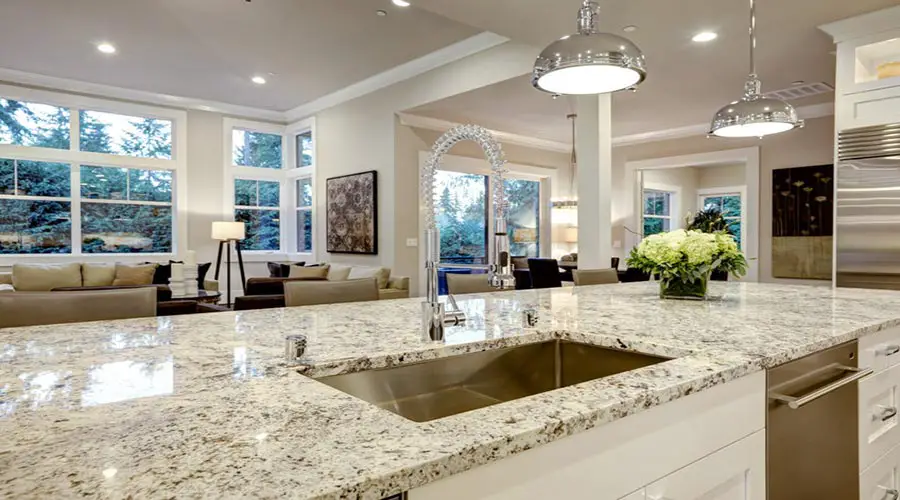
Corian vs. Granite Composition
Granite is a natural material that is acquired through mining. The miners harvest the natural rock from the quarries and sell it to the manufacturers. After that, the companies cut the stone into slabs, shape, and polish it. They do not add nor remove anything from the original product.
Corian is synthetic. It consists of binding resins, minerals, dyes, and other fillers that proffer its original look. Corian is a product of DuPont, and it was the only option for a while until competing companies entered the market.
The cost of countertop material is primarily due to manufacturing and installation labor. Notably, natural products are usually more expensive because it takes more time and effort to mine than from the ground.
The purity of granite makes it more costly than Corian. However, as Corian products begin to match stone’s natural beauty, the cost savings erode. For example, quartz counters can sometimes exceed the cost of granite.
Of the two, granite tends to be heavier.
Corian vs. Granite: How They Look
Granite has a fascinating pattern that is natural and not planned whatsoever. This means that whatever pattern the original stone was, the resulting granite countertop will appear the same.
Corian being artificial offers a broader range of appearances. The patterns, color options, and designs provide a uniform look, unlike granite surfaces where no two granite slabs are identical. Plus, the makers can integrate it with other materials like glass, stone, and wood.
Corian can also take different textures. You can have countertop surfaces that mimic the look of natural stone, wood, glass, and marble.
Of the two, the versatility of Corian is favorable, but people still prefer the uniqueness that granite brings to the table, quite literally. No granite countertop looks the same as another makes it valued higher than its competition.
Corian & Granite: Installation
Since installation is a significant factor in overall expense, it is substantial to compare why Corian is cheaper than granite.
Corian’s lightness and versatility make it an easy installation project, even when DIY. One can cut it using a circular saw to the shape and size and install it with no visible seams.
It is much more complicated to do for heavy granite countertops, so it is better to leave the job to professional installers. They know how to handle, cut, and even fit it. On that note, installing granite is far more expensive compared to Corian.
Sure, you may take up the challenge to install a granite countertop yourself, but you might be setting yourself up for failure. You must remember that if you cut it the wrong way and try to make the seams disappear, you damage it. This will then force you to get new slabs. Also, if you drop one, it becomes another cost you will have to incur in replacing it.
Corian & Granite: Maintainance
When you pour acidic liquids like vinegar and lemon juice, granite stains quite a bit. And that is why granite countertops necessitate the owner to seal them at least once per year. It is also prone to chipping and cracking if you drop heavy items on the counter.
Unlike Granite, Corian counters do not stain. Thus, you don’t have to think of sealing maintenance costs.
The good thing about granite is that it is scratch and heat-resistant. You can immediately place a hot pan or pot from a fire. Corian does not offer you the same protection from high temperatures. Anything hotter than 325 degrees Fahrenheit can cause permanent damage to a Corian countertop.
Corian is not scratch resistant. It is prone to damage from cutting your veggies or meat without a cutting board. The good news is that you can buff these scratches on a Corian countertop using a scouring pad.
The overall maintenance of both is easy and cheap. You only need soap and water for basic cleaning and bleach and ammonia for a sanitizing clean.
When it comes to granite, please refrain from using bleach, ammonia, or vinegar too much as it may react with the roc when it comes to granite. This may result in the stone appearing dull. And this is why sealing is paramount.
Other Factors that Differentiate Corian & Granite
Here are a few extras that differentiate these two solid surface materials:
Health Hazards
Corian countertops meet all the safety regulations regarding the emissions guidelines for volatile organic compounds, also called VOCs. It is also clear from any hazardous air pollutants, HAPs. Additionally, it is Greenguard certified. It is non-allergenic for both humans and pets. It does not have any heavy metals.
Granite, on the other hand, may contain naturally occurring radioactive elements. And when these radioactive elements decay over time, they produce radon. Radon is odorless and colorless, meaning you will not be able to see or smell it. When you have long-term radon exposure, you are at a high risk of getting lung cancer.
Regardless, the EPA attests that most granite that makes countertops for any residential or commercial space is safe.
Bacterial & Pathogenic Resistance
Corian being a synthetically made material, is naturally a pathogen and bacteria-resistant countertop. This means that any spills containing germs will not get absorbed by a Corian countertop.
Granite remains clean with routine cleaning, although it may harbor bacteria and other pathogens over time. This is because of its porous nature. Spills containing these pathogens may sip into the countertop, and they can start living and multiplying.
For these reasons, places requiring clean counters like kitchens best use the Corian instead of granite.
However, this is not to discredit graphite entirely. One study done by the Hospitality Institute of Technology and Management suggests otherwise. It states that granite is a safe surface as long as there is a routine cleaning and disinfecting practice.
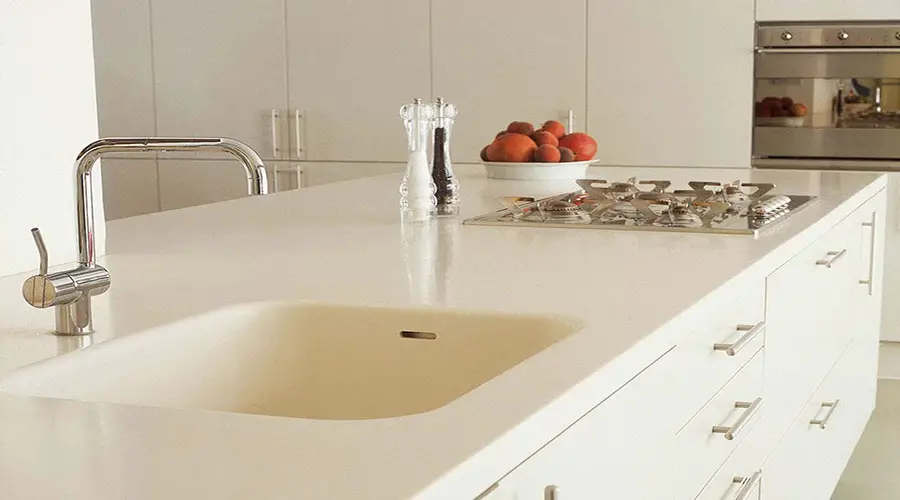
Corian vs. Granite Countertops
Despite the pricing factor that we established that Corian is cheaper, there are a few problems with each counter type. Here they are and how you can solve them:
Corian
Denting And Scratches
You can easily dent or scratch a Corian countertop with little effort. Dropping a heavy load and cutting items without a chopping board are the leading causes of these issues. And when this happens, it makes the countertop less appealing.
The solutions to these problems are elementary and may cost you a few bucks or nothing. Suppose the dent or crack is big; you must replace the whole countertop. But if it is a small one, you can cover it up using a filler.
You can sort out the scratches using a scouring pad, buff the scratches out, and finish off by polishing the surface.
Warping
When you accidentally place a hot pan or cooking pot on a Corian countertop, the surface will bend, deforming the countertop’s shape. When this happens, you have no choice but to replace the affected tile or the entire countertop, depending on the damage.
This extra cost includes buying, transportation, service, and installation. But if you do it independently, you will reduce this expense.
The solution to prevent warping is to refrain from placing hot substances on a Corian countertop. You should also get a heat-resistant material and place it between the countertop and the hot pot if you must.
Non-Reusable
If you move and want to use the same Corian countertop tiles, be aware that they may not function. If you want a polished look in your new location, you’ll need to acquire a new set of tiles.
Alternatively, repurpose them and place them somewhere else. Consider the countertop in the backyard or the one on the patio.
Granite
Staining
Granite is a natural stone, and staining is the main issue that can be a headache. You can stain a granite countertop with most colored liquids and oils. And they all leave an undesirable map on the surface.
The great news is that baking soda is a remedy you can use. Make a paste of baking soda with acetone. Then scrub away the map. This paste will, however, work for organic stains only. Bleach can also be used but only in moderation. Using it all the time will make your granite countertop dull.
The best solution is to seal the countertop.
Eerie Etching
Eerie etching is an issue that occurs when you expose granite to vinegar. Fruit juice and ammonia also do the same to a granite countertop. The result is a dull countertop that looks less shiny and less appealing.
The solution to this problem is also sealing the graphite countertop. This is to ensure that nothing corrosive does any damage to the stone. Another simple solution is to clean all spills immediately and not use any detergent with any acidic properties.
Hazing
Hazing is when the countertop appears cloudy. This occurs because you might be using a detergent that is most certainly causing a reaction with the granite.
If you notice this, reevaluate your soap and change it. Opt to use stone-safe soaps instead.
Frequently Asked Questions
Is Corian More Expensive than Granite?
Corian, especially the basic versions, is generally less expensive than granite. However, despite what some may claim, there are some instances where Corian can be more costly than granite. While granite is generally priced by thickness and rarity, numerous factors affect the cost of Corian products.
Corian prices average $45 to $65 per square foot but can also be as high as $200 a square foot for quartz surfaces. The national average of a Corian countertop is $2,000 to $5,000, which aligns with granite at $2,250 to $4,500.
Is Corian as Good as Granite?
This is determined by what’s most important to you. Corian offers the benefits of a nonporous, durable surface with less maintenance. However, Corian is not scratch or heat resistant and, for many, lacks the beauty of the natural stone. Corian can be permanently damaged when in contact with temperatures above 325 degrees Fahrenheit.
On the other hand, granite surfaces are beautiful, durable, and heat resistant surface. However, because the stone is porous, it requires sealing every 6 to 12 months to prevent acidic cleaning products from damaging it.
What are the Disadvantages of Corian?
The two main disadvantages of Corian include:
- It is not heat resistant and can be permanently damaged when in contact with temperatures above 325 degrees Fahrenheit.
- It can easily scratch from everyday use. Using a cutting board for cutting meat and chopping vegetables is essential.
Are Corian Countertops Out of Style?
Styles and trends change over time. Corian countertops have continued to evolve since DuPont first created them. Corian has evolved to curb complaints that the product was bland and had a more commercial appearance.
Part of the Corian evolution has included quartz countertops with a more natural look and improved durability. Hot pots than natural granite more easily damage Corian countertops in terms of durability. It’s also more susceptible to scratches than quartz and granite, among other things.
Granite, and other natural stone surfaces, have a more timeless appeal that can far outlive flashy trends, which generally carries over in higher resale values when it’s time to sell your home.
Bottom Line
Are Corian countertops cheaper than granite? Yes, based on what we have covered and numerous pieces of evidence. The reason is that Corian is a synthetic product, whereas granite is a naturally occurring stone.
Regardless, Corian is the most cost-effective material to utilize in your house. Both provide stunning countertops, but Corian is the less expensive alternative.
Are you looking for new granite, quartz, Corian, and wood countertops? If so we can help. Get FREE quotes for local countertop installers. All contractors are licensed, screened, and insured.


